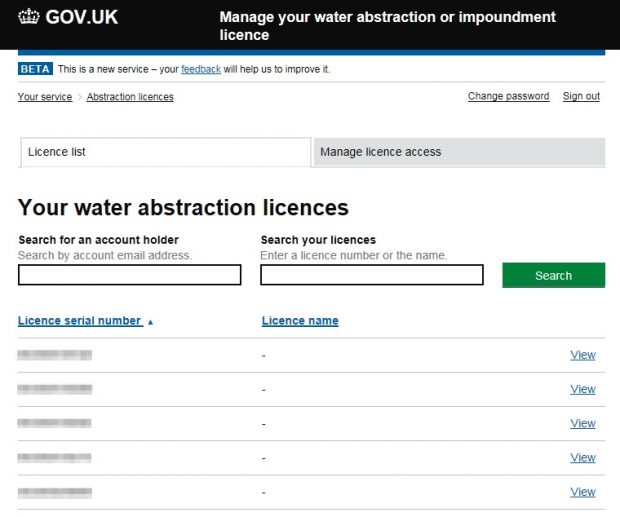
Taking fresh water from any natural source is called "abstraction". Most people or organisations who want to abstract more than 20,000 litres of water per day from any single water source in England have to apply for a licence from the Environment Agency.
A typical water abstractor might be a farmer who wants to use water from a river on their land to irrigate crops, or perhaps a company that wants to purify and distribute the water for sale to the public.
Regular readers of this blog won't be surprised that the process of applying for and issuing those water abstraction licences is almost entirely paper-based at the moment. (There are some digitised forms that exist as PDF files, but that's about as digital as it goes.)
Needless to say, this is an aspect of our work that's ripe for transformation to a modern digital service. A team in our Bristol office has been working on this for a few months now, and recently moved from alpha to private beta.
Making it easier to view licences
The team is working in agile ways, and has started with a relatively small slice through the larger service. They’ve built a licence viewer, allowing existing licence holders to securely view some of the important details of water abstraction licences they hold.
You can see a screenshot of it at the top of this post.
The majority of water abstraction licence holders (mostly landowners or farmers) just have one licence. But some larger businesses can hold and manage a couple of hundred licences. So the beta service allows these users to search through a list of their licences and assign them "nicknames", which makes it easier for users to track which licence is which.
In common with a lot of private betas, this one is only open to a small handful of beta testers providing valuable feedback for the team. Right now, that means 37 users within Defra group and 11 external users.
What the team has learned
So far, the Bristol team say they've learned to:
… keep things simple - they decided early on to limit the alpha and beta to viewing existing licences. Good prioritisation means faster progress. More advanced features, such as applying for or renewing licences, can be added later.
… be flexible - by adjusting the way they work to the circumstances surrounding them. For example, by changing the lengths of their work sprints, or by doing less work than originally planned in subsequent private beta sprints to ensure that they could keep iterating in small increments.
… build an effective team - the team quickly built an environment of trust, making open communication easier. They can discuss ideas, opinions and issues transparently, and make evidence-based decisions quickly. Having the whole team located in the same place (not something that's always easy in a national organisation like Defra) is also a huge help.
Why this matters
Not many people outside of Defra and the water abstraction user community have ever heard of "water abstraction" - it sounds like another bit of boring civil service bureaucracy.
But it's important, because sustainability of water supplies underpins our lives and livelihoods. Ultimately, that's the policy intent that this work is all about - ensuring that water sources in England are sustained and cared for, on behalf of everyone who depends on them. Use of these water sources is critical to providing electrical power to our homes and businesses, supporting our agricultural industry and ensuring public water supplies.
Water is a resource, something we need to look after just as much as any other resource.
This is not just an exercise in turning a paper service into a digital one. Digitising water abstraction licences means that we can be more flexible about how water resources are managed and allocated. We’ll be able to make better use of water when it’s available, and provide better protection for the water environment when it’s not.
But it goes deeper than that: it will also make it easier for abstractors to understand and meet the conditions of their licence, plan their abstraction activities based on local information, and ultimately do good for the environment. Ultimately, digitisation will enable far more and better services for our users than paper can.
This private beta is one step along the path towards that future.
Congratulations, Bristol team - we're delighted to see the progress you're making on this and other new and improved digital services. We're looking forward to your next iteration.
Recent Comments